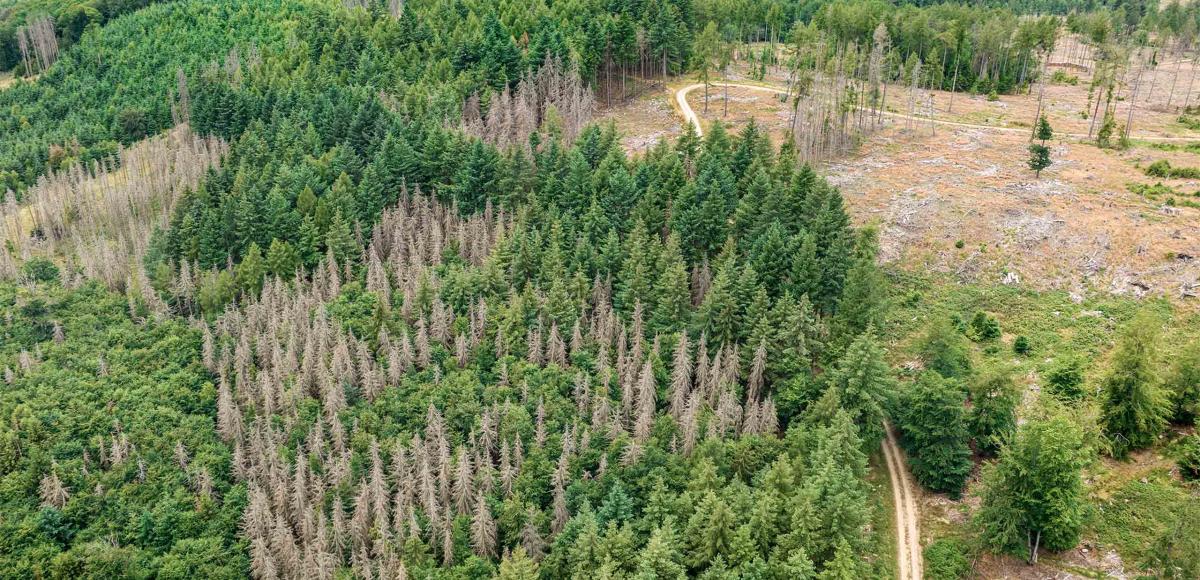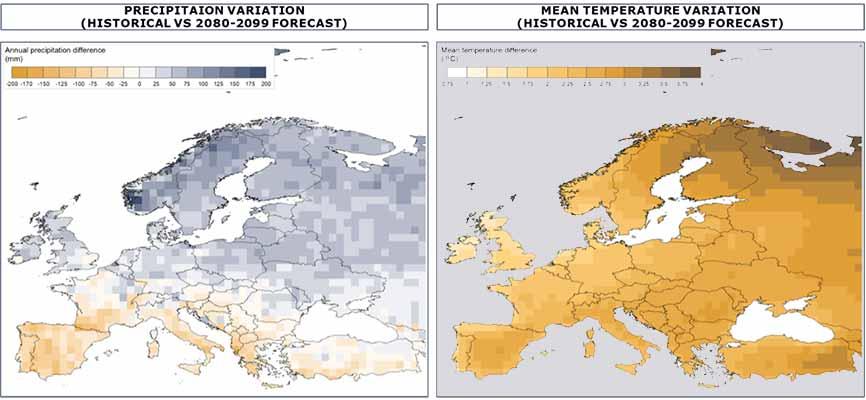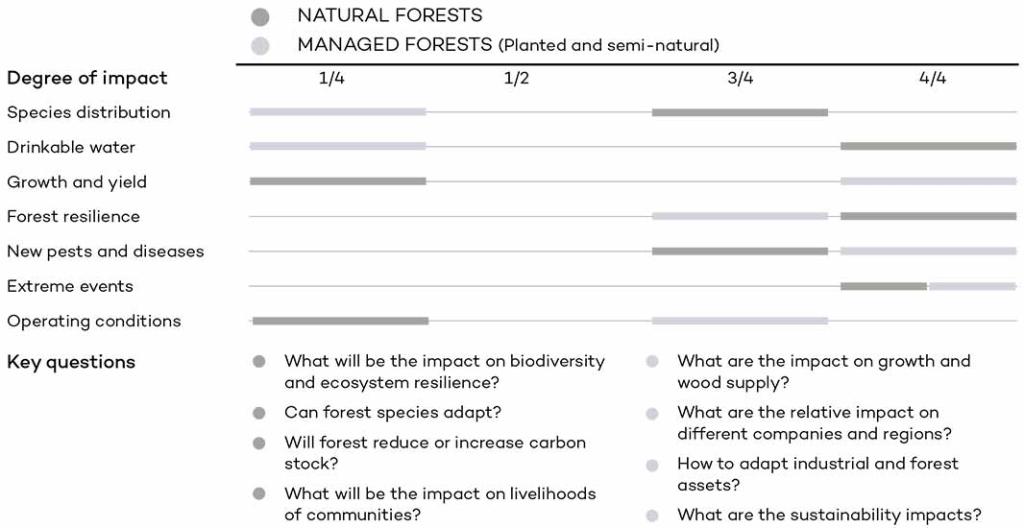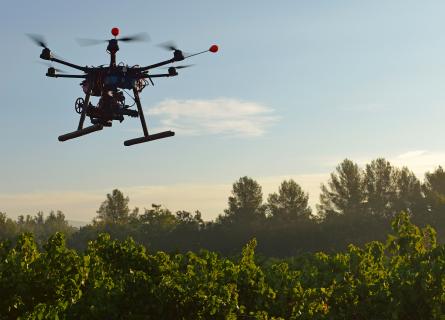
Bugs and fires
Climate change impact on forestry
As we embark on the route to net zero, forests and forestry science have been at the centre of the discussion. Whether we are discussing reducing the deforestation of native forests, growing forest areas through afforestation and reforestation projects or increasing the usage of wood-based products in substitution of more carbon-intensive materials, mentions of forests are everywhere.
The relationship between forests and climate change is a two-way street. On one hand, forests act as CO2 storage, removing carbon from the atmosphere that would otherwise contribute to global warming. On the other hand, climate change is impacting the distribution, health and growth of forests around the globe. Forests' importance goes beyond their climate contribution as they also provide other ecosystem services related to biodiversity, soil and water, and generate renewable resources that are key for our transition to net zero. Thus, understanding the potential impact of climate change on them is crucial.
According to the IPCC's Special Report on Climate Change and Land (2019), changes in the climate will have positive and negative impacts on forests depending on their location and characteristics. The effects of the climate on forests can be divided into two categories. One category relates to basic climatic variables such as temperature, precipitation and carbon concentration, among others. The second category relates to how these and other variables interact, producing extreme events such as prolonged droughts, floods, storms, fires et cetera.
Such changes in conditions do not only impact forests directly but also decrease forests’ resilience to pests and diseases and ease the spread of invasive species. For instance, prolonged droughts and fires followed by major pest outbreaks are becoming more and more common, as seen in Europe (spruce beetle), Canada (pine beetle) and Brazil (eucalyptus bronze bug). The IPCC forecasts outbreaks of pests and diseases with a much shorter recurrence period.
If we examine the World Climate Bank's data on the impact of precipitation and temperature variation based on a temperature increase of 2.6°C by 2100 (‘Middle-of-the-road’ scenario), we see positive and negative impacts. Southern Europe, especially Spain, Portugal and Italy, are likely to be negatively impacted by a decrease in rainfall and an increase in temperatures. At the same time, the Nordics are likely to benefit from an increase in rainfall and a prolonged growing season. It is important to highlight that these impacts should not be considered on their own as isolated events but together with several other factors.

Changes like the ones highlighted here are happening everywhere. AFRY has been advising several clients on how to assess, quantify and mitigate risks. Such assessments can focus either on natural forests and their impact on biodiversity, rural communities and resilience or on commercial forests and their impact on wood sourcing, costs and competitiveness. The table shown highlights the key aspects and questions for each situation.
AFRY has recently been working with Stora Enso to understand climate risks in its forest operations. Johan Carlsson, SVP Group Strategy & Business Intelligence at Stora Enso, had the following to say about this recent assessment:
Why is Stora Enso interested in assessing climate risks?
Stora Enso is one of the largest private forest owners in the world and one of the biggest consumers of wood and biomass globally. As such, it is very important for us to gain the best possible understanding of the impact that global warming is likely to have on our forest assets, wood markets and wood supply going forward.
To be able to quantify the potential impact of different climate-change scenarios in both the short and long term helps us to assess risks, develop adaptation plans and make informed strategic choices.
What are the most important insights in this area for Stora Enso?
Forest asset productivity and wood supply are likely to be negatively impacted in all scenarios of future climate change. However, there will be big differences in the drivers and the impact between assets, markets and locations, even when they are in relatively close geographical proximity to each other. Hence, it is important for us to understand the relative resilience of our assets and how the competitiveness of our operations is likely to develop over time. The insights also help us prioritise mitigation actions and develop adequate adaptation plans.
In addition to the impact on forest productivity, climate change will also change the forestry operation conditions in many geographies. According to IPCC, air temperature and relative humidity are expected to reduce physical work capacity in Latin America, West and Central Africa, India and Southeast Asia, restricting operational activities like planting and manual harvesting. In the northern hemisphere, in places like Canada and the Nordics, where frozen conditions are relied upon for harvest operations, a reduction in the harvesting season is likely to happen.
All these changes will impact not only forests but also agricultural value chains and food production, increasing the competition for land. In this framework, forests are likely to suffer even more, and we need to address several important topics, for example:
The impact on natural forests needs to be assessed with clear mitigation measures to preserve biodiversity and carbon storage and improve the livelihoods of indigenous and other rural communities.
Semi-natural and plantation forests with the primary target of wood production will most likely explore new geographic frontiers. In this transition to new areas, ensuring the sustainability of projects regarding local communities, biodiversity and water balance is essential.
Industries reliant on virgin wood supply need to understand what is changing, including the impact on different wood supply basins and then lead the transition through R&D considering costs and yield as well as the resilience of forests and operations. Forests are among our most important solutions to solving climate change, and we need to ensure their growth and health in the long term while promoting sustainable usage of their resources. Governments, private companies, NGOs and the scientific community need to work together to address this complex topic. In this way, we can address climate change through and with forests.


Bioindustry Management Consulting
Our service offerings, from corporate strategy to process design and from market insights to operational efficiency backed up by an understanding of best practices, detailed in-house databases, and analysis led by experts in the field, ensure your outstanding performance. We want to be your trusted partner.





